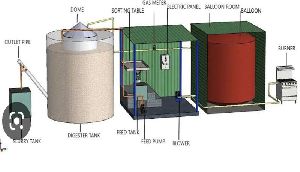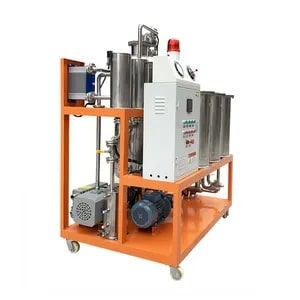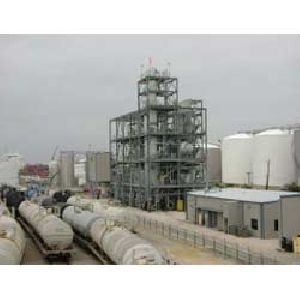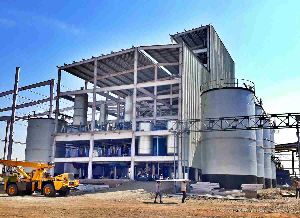
bio diesel plant
Get Price Quote
1 Piece (MOQ)
What is Biodiesel? Biodiesel is fatty acid methyl esters (FAME) of vegetable oils and fats or animal fats. It can be mixed with any proportion of fossil diesel and distributed as commercial diesel for transportation Biodiesel Process Transesterification Reaction: LIPICO'S Property reactor designer allows continuous removal of glycerol during reaction in order to achieve maximum conversion. Glycerine is separated from biodiesel using separator. Washing: The use of counter-current washing reduces water consumption by 50% as compared to one-stage washing. Centrifugal separator is used in this application. Drying: Residual moisture in methyl ester is dried in vacuum dryer before sending to product storage tank Glycerine-water treatment Mixture of by-product containing residual catalyst, excess methanol, soap, glycerine, and washed water will undergo acid treatment where strong acid (such as hydrochloric acid) is used to neutralize the residual catalyst and to acidulate then soap for converting into fatty matter. The treated glycerine-water methanol mixture is then dosed with a controlled amount of caustic to adjust the PH of mixture to -PH 7 Prior to methanol rectification. Methanol Rectification : The mixture is heated and distilled in the rectification column where high purity methanol is fully recovered and recycled back to the transesterification reaction. Glycerine Evaporation : Glycerine-water from methanol rectification plant is evaporated to a purity of 78-82%. Multiple effect evaporator is used to achieve high steam economy. Clean evaporated water is re-used in the washing section

Biodiesel Machinery
Get Price Quote
Payment methods that we offer to our clients are authorized and maintain complete confidentiality of clients' information. With us, one can make payment using cash and bank transfers. Seeking a trusted Biodiesel Machinery supplier? Our organization is the best one and able to fulfill wholesale orders.
Best Deals from Bio Diesel Plants

Bio Gas Plant for Corporation
Get Price Quote
1 Piece (MOQ)

Biodiesel Plant
Get Price Quote
Bio Diesel Extraction Plant For every type of edible/non edible oil, we engineer and develop Bio-Diesel extraction Plant. In our range, we have different capacities of extraction plants ranging from 500 liter/day. In addition to this, transesterification plant comprises of reaction tank, catalyst mixture, washing system and settling tanks and methanol recovery. Bio-diesel is the product obtained by transesterification of any vegetable oil. Derived from renewable lipid sources, biodiesel is defined as the mono alkyl esters of long chain fatty acids. In the presence of a catalyst, the reaction of a vegetable oil or animal fat with methanol is carried out to yield glycerin and biodiesel. Details : For use in compression ignition engines, bio-diesel is an alternative fuel that can be used in neat form, or combined with petroleum diesel. Used a fuel in diesel engine, the chemical and physical properties are similar to petroleum based diesel fuel. We have experience of years in offering highly advanced and sophisticated transesterification unit, which is widely used in agro industries involve processing and extraction of bio-diesel. Through these units, bio-diesel is produced in bulk quantity for use in the commercial market as an automobile fuel. The machines involve highly sophisticated and PLC based processes. Post the extraction of pure diesel, the by-products left over like glycerol is also marketable. Depending on the requirement of clients, these units can be offered in various capacities.

Automatic Biodiesel Production Plant
2,500,000 Per Piece
1 Piece (MOQ)

Biodiesel Plant
Get Price Quote
Biodiesel is an alternative diesel fuel. Biodiesel Plant is produced by chemically reacting a vegetable oil or animal fat with a primary alcohol. The resulting compound is called an alkyl monoester and has properties, that allow it to provide equivalent performance and superior emissions compared to conventional diesel. Biodiesel is renewable, non-toxic, as well as biodegradable. This Biodiesel plant can produce biodiesel using Jatropha, Karanja, Neem or any other vegetable oil (with low FFA) by converting the triglycerides into methyl esters by transesterification Process.Biodiesel is an alternative diesel fuel. Biodiesel Plant is produced by chemically reacting a vegetable oil or animal fat with a primary alcohol. The resulting compound is called an alkyl monoester and has properties, that allow it to provide equivalent performance and superior emissions compared to conventional diesel. Biodiesel is renewable, non-toxic, as well as biodegradable. This Biodiesel plant can produce biodiesel using Jatropha, Karanja, Neem or any other vegetable oil (with low FFA) by converting the triglycerides into methyl esters by transesterification Process.

Biodiesel Process Plant & Equipment
Get Price Quote
1 Piece(s) (MOQ)
Backdrop : Devastating long-term ill-effects of limited fossil fuel reserves, industrial & automotive emissions and greenhouse gases have focused the attention of policy makers and others throughout the world to search for alternative energy sources. Solar radiation, wind and biomass are resources for generation of alternative energy in vast quantities of which biomass is already proven for techno-economic viability for commercial production of a major alternative energy - BIODIESEL. The U.N. framework for climate change [Kyoto Protocol, 2005] mandates member nations to reduce greenhouse gas emission through increasing use of biofuels i.e. bioethanol and biodiesel. Global production of biofuels is growing steadily and will continue to do so despite financial slowdown. The world biofuel market’s value is likely to attain a CAGR of around 14.7% during 2006-2016. The rapid development of the global biodiesel industry has been closely observed by countries interested in stimulating economic growth, improving the environment and reducing dependency on imported oil. Chemically speaking, biodiesel is the methyl ester of long chain fatty acids derived from vegetable oils animal fats. It can be used in compression ignition engines (diesel engines) directly, the engine needing minor or no modifications. Raw Material for Biodiesel : Biodiesel can be commercially produced from various sources (Oil seeds – both edible and non-edible, dead wood and leaves, agri-wastes, food processing wastes – both kitchen and industry etc. can be used, oil seeds being the most important, abundant and common raw material). Different regions of the world do not have the benefit of possessing the same vegetable oil or animal fat in plentiful supply. Thus raw materials for biodiesel production have become geographically region-specific. Palm oil seeds in Malaysia, animal fats in Japan, soybean seeds and animal fats in the US, canola seeds in Canada and rapeseed and animal fats in Europe are examples. India has taken up Jatropha [ Jatropha curcas ] seeds as the major raw material. The plant may yield more than four times as much fuel per hectare as soybean, and more than ten times that of maize (corn). A hectare of jatropha has been claimed to produce 1,892 litres of fuel. Advantages of Biodiesel Over Petrodiesel : Less dependence on limited fossil fuel reserves Improved ignition Higher engine efficiency Better lubricity Much lower greenhouse gas emission Lower particulate emission Not toxic, free of sulphur Safest fuel to store and handle Much higher flash point No aromatics or carcinogens Biodegradable FenixShutek Technology for Biodiesel : Fenix has exclusive technology collaboration with M/s Shutek Oleo S A of Costa Rica for Biodiesel. The process uses trans-esterification reaction followed by neutralization and washing steps. The two-step trans-esterification converts nearly 100 percent of the triglycerides in the oil or fat to bio diesel (methyl ester). The excess methanol is recovered, and the biodiesel dried in the same step. Finally, the bio diesel is filtered to remove potential impurities formed below the process temperature. In essence, the steps are, trans-esterification, washing, drying and polishing. Almost any seed oil can be used as the raw material for FenixShuyek Biodiesel Technology. Glycerine Recovery Glycerine generated in the two-step trans-esterification reaction is recovered and neutralized. The excess methanol is recovered and the glycerine dried in the same step. The glycerine is considered crude glycerine because it contains greater than the maximum 0.01 percent salts allowed in technical grades and is less than 99 percent pure. The salts are formed from the reaction of the caustic and acid used in most trans-esterification processes. The salts are removed when the glycerine is distilled or refined to a technical grade or higher quality. Water Recovery Water recovered from the water wash decanter, strippers, and methanol distillation is reused for washing the bio diesel and diluting the acid and caustic. Methanol Recovery The excess methanol is recovered from the bio diesel, glycerine, and fatty matter, dried and reused in the two-step trans-esterification reaction. Fenix uses it own structured packing columns for effective distillation of methanol. Fatty Matter Recovery A small amount of fatty matter, typically mono- and di-glycerides, is generated in the trans-esterification reaction. This fatty matter does not require a separate recovery system due to the small quantity generated, and can be skimmed or decanted from the glycerine storage tank. If the trans-esterification process feedstock has a high amount of free fatty acid (FFA), then a separate fatty matter recovery step may be required. Energy Fenix design minimizes the energy required by using gravity both for separation and flow from vessel to vessel. The design incorporates heat economizers to cool one stream while heating the other.

Biodiesel Oil Refinery Plant
Get Price Quote

biodiesel production plant
6,500,000 - 10,000,000 Per Plant

Jatropha Ratanjot Biodiesel Plant
Get Price Quote

Biodiesel Plants
Get Price Quote
We are a renowned name in the market for providing the best Biodiesel Plant at affordable charges. We are a renowned name in the market for providing the best Biodiesel Plant at affordable charges. We are a renowned name in the market for providing the best Biodiesel Plant at affordable charges.

bio diesel plants
Get Price Quote
Headquartered in Kolkata India, Biodiesel Technologies was conceived in 2002 in response to the serious environmental and health hazards arising out of the various polluting emissions casing our environment. Biodiesel Technologies was conceived by a group of Technologists with a comprehensive professional experience with multinational companies under the able stewardship of Mr. Amitabha Sinha who is the M.D & Chief of Technology of the compan

biodiesel production plant
10,000,000 - 400,000,000 Per Piece
1 Piece (MOQ)

Biodiesel Plant
5,000,000 - 120,000,000 Per piece
1 piece (MOQ)

Automatic Biodiesel Production Plant
Get Price Quote
1 Piece (MOQ)
Automatic Biodiesel Production Plant

biodiesel production plant
Get Price Quote

Biodiesel Extraction Plant
Get Price Quote

Biodiesel Plant
Get Price Quote
Being a client-centric organization, we are engaged in offering a wide gamut of Bio-Diesel Plant. This range is designed and fabricated making use of optimum-grade raw material and latest technologies installed at our sophisticated manufacturing unit. This highly durable and excellent performing range is offered by us in various custom-designed models to meet the variegated requirements of our patrons. These bio diesel plants are checked on various quality parameters before being dispatched to ensure their flawlessness. Product Details : Minimum Order Quantity - 1 Unit Automatic Grade - Automatic, Semi-Automatic, Manual Design Type - Standard, Customized Capacity - As required Price - Approx. Rs 15 Lakh Per Unit Feature : Consumes less power Needs less maintenance Excellent in performance Longer service life Compact designs Note : Prices will be depend on capacity and specifications.

biodiesel production plant
Get Price Quote
We are Manufacturer, Supplier & Exporter of Biodiesel Production Plant. Biodiesel can be used in compression ignition engines without any modification. It is produced by continuous trans-esterification reaction of seed oils with methanol using caustic soda as catalyst. It is carried out in two or three stages with subsequent washing drying and polishing of the product.

biodiesel production plant
Get Price Quote
01 Piece(s) (MOQ)
Choosing the right technology partner for biodiesel processing is critical to meet the challenges of feedstock treatment, yields, quality and consumptions of chemicals & utilities. DVC Process Technologists offers the best solutions for commercial viability in the processing of the most challenging feedstocks, through both chemicals as well as enzymatic routes over various capacities.